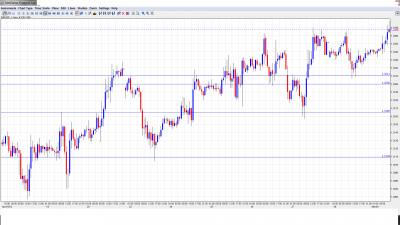Euro dollar edged higher, as the euro has quietly climbed 250 pips since the first week in April, with small but steady steps upwards. At the same time, the markets are very concerned about the fiscal situation in the Euro-zone, and these worries have grown on the news that the Spain’s economy was in recession in Q1. Across the ocean, US data started the trading week on a sour note – Chicago PMI was well below the market forecast at 56.2, falling to its worst level since November 2009. With a national holiday in France, Germany, and Italy, and no Euro-zone releases scheduled, all eyes will be on the US today. There are four releases out of the US today, with Manufacturing PMI being the most important. If today’s data disappoints, we could see EUR/USD make further moves upwards.
Here’s an update on technicals, fundamentals and what’s going on in the markets.
EUR/USD Technicals
- Asian session: EUR/USD continued to move upwards, climbing to 1.3260 and consolidating at 1.3250. The pair is unchanged in the European session, trading at 1.3255.
- Current range: 1.3212 to 1.33.
- Further levels in both directions: Below: 1.3165, 1.3110, 1.3050, 1.30, 1.2945, 1.2873, 1.2760, 1.2660 and 1.2623.
- Above: 1.34, 1.3437, 1.3486, 1.3550 and 1.3615.
- 1.3212 continues to provide support to the pair.
- 1.33 is the next line of strong resistance.
Euro/Dollar higher after weak US PMI – click on the graph to enlarge. EUR/USD Fundamentals
- 14:00 US Manufacturing PMI. Exp.53.0 points.
- 14:00 US Construction Spending.Exp. +0.5%.
- 14:00 US Manufacturing Prices. Exp.59.1 points.
- 15:00 FOMC Member Williams Speaks.
- All Day: US Total Vehicle Sales.
- 15:30 FOMC Member Lacker Speaks.
- 16:30 FOMC Member Lockhart Speaks.
For more events later in the week, see the Euro to dollar forecast
EUR/USD Sentiment
- Spanish downgrade could spook markets: Rating agency S&P cut two notches off Spain’s credit rating and set it at BBB+ which means “adequate payment capacity”, at the same level with Italy. According to Fitch and Moody’s, Spain’s rating is higher, at the equivalent of “strong payment capacity”. This will force some institutional managers to sell Spanish bonds, which are already under severe pressure. The markets are worried that the recession in Spain will make it difficult, if not impossible, for the government to tackle its serious deficit problems. Spain has a toxic mix of economic issues, with the high unemployment rate being only one of them. Spain is in a serious crisis. See the Spanish prospects. Meanwhile, data released on Monday confirmed that Spain is officially back in recession, with GDP declining by 0.3% in Q1 after a 0.4% fall in the previous quarter.
- Recession in Euro-zone Spreads: Spain is the latest member of a growing list of European economies now in recession, including the UK, Netherlands, Belgium, Ireland, Greece, Portugal, Italy, Denmark, the Czech Republic and Slovenia. Weak spending in France and lower confidence in Germany is sure to make matters worse.The deepening economic slowdown will likely have a negative impact on the euro. Urgent action is needed, but the slow and confusing response by the fiscal authorities to the recent debt crisis in Greece is not encouraging, to say the least.
- US economy: strong Q1 but weak data causing concern: All in all, Q1 was quite good in the US, but the world’s no. 1 economy is showing signs of slowing down. Another US recession seems unlikely at this point, but the US isn’t the locomotive either. GDP for Q1 disappointed the markets, and the Chicago PMI sagged badly. If the trend of weak data continues, the euro is likely to take full advantage and continue to make gains against the dollar.
- Fed maintains mixed message: Ben Bernanke didn’t rule out QE3, but as time passes by, this option seems quite unlikely, and even Bill Gross seems to back off his certainty that this move will come. For those lovers of English nuances, the Fed referred to inflation as having “picked up” rather than being “subdued”. Of course, traders are more concerned, and rightly so, with the market reaction to the Fed announcment, rather than linguistic acrobatics.
- Italy pays higher prices: A fresh auction for 10 year Italian bonds yielded higher yields once again, at 5.84%, higher than the secondary market that prices the bonds at a yield of 5.73% at the time of writing. Higher borrowing costs will only complicate attempts by the government to set its fiscal house in order. Although the situation is not as dire as that of Spain, further instability in the Euro-zone’s third largest economy could spell big trouble for the continent and the euro.
- Elections in Europe loom: Elections will be held in both France and Greece later this week. In France, Socialist challenger Francois Hollande will face President Nicholas Sarkozy in the presidential run-off after inconclusive results in the first round. Hollande is not considered pro-market, and the euro could nosedive if the Socialists win. In Greece, with its tottering economy, the voters may send the present government packing. Just to add to this mix, the Dutch government resigned over budgetary difficulties, and elections will be held shortly. The EU is worried, and rightly so.

